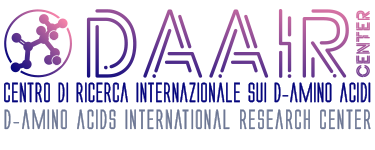D-amino acids in diseases
– Chronic kidney disease: D-amino acids have been proposed as potential biomarkers in kidney disease
– Immune system: D-amino acids modulate innate immune response
D-serine:
Over- or down-stimulation of N-methyl-D-aspartate receptors (NMDAR) is related to psychiatric disorders (e.g., schizophrenia, bipolar disorder) and acute and chronic degenerative disorders (e.g., Parkinson’s and Alzheimer’s disease (AD), stroke, epilepsy, and peripheral neuropathies). D-Serine and glutamate are supposed to represent a link between neuroinflammation and excitotoxicity. D-serine is involved in the following pathological states:
– Schizophrenia: hypofunction of NMDAR because of D-serine decrease
– Familial ALS (fALS): the R199W DAAO variant is responsible of motoneurons death induced by excitotoxicity
– Alzheimer’s disease (AD):β-amyloid induces SR expression and D-Ser release
– Addiction: decrease in D-serine level in nucleo accumbens abstinence following cocaine treatment
– Neuropathic pain: inhibition of DAAO (and hydrogen peroxide production) gives and analgesic effect in neuropathic pain and bone cancer
– Chronic kidney disease: D-amino acids have been proposed as potential biomarkers in kidney disease
D-Asp is involved in:
- Increase of testosterone levels in male infertility;
- Brain hormone’s release;
- Schizophrenia by NMDAR modulation: protective role against sensorimotor-gating deficits;
- Alzheimer’s disease (AD): decreased level in human brain from patients;
- Age-related synaptic plasticity deterioration (in mice);
- Multiple sclerosis: its administration has beneficial effects on an experimental autoimmune encephalomyelitis model by attenuation in the severity and delay in the onset of the disease;
- Alleviation of pain and cognitive impairment (in mice).
Download List of most relevant papers regarding D-amino acids and Alzheimer’s disease
